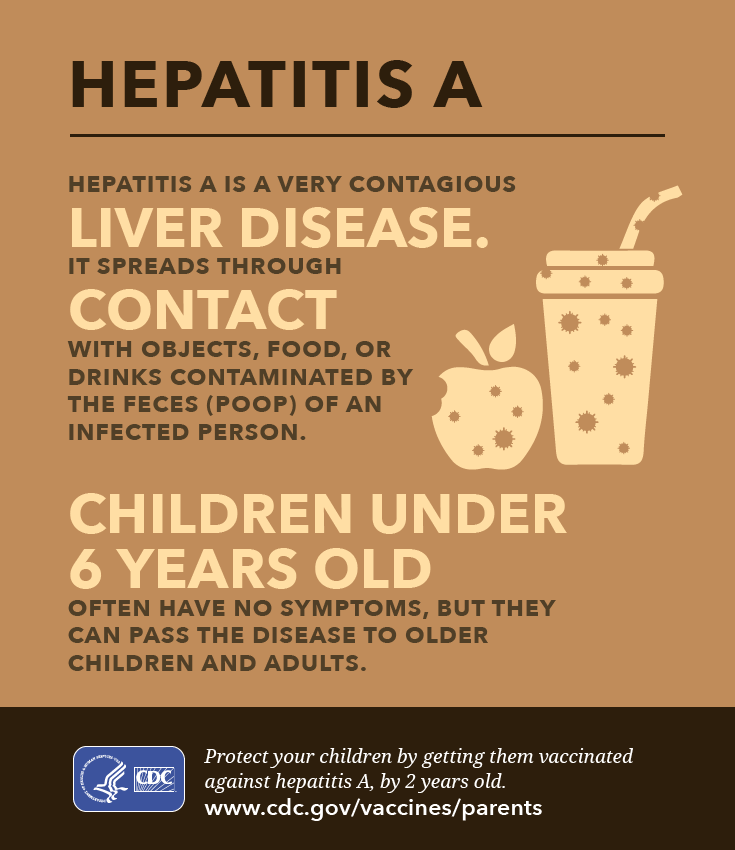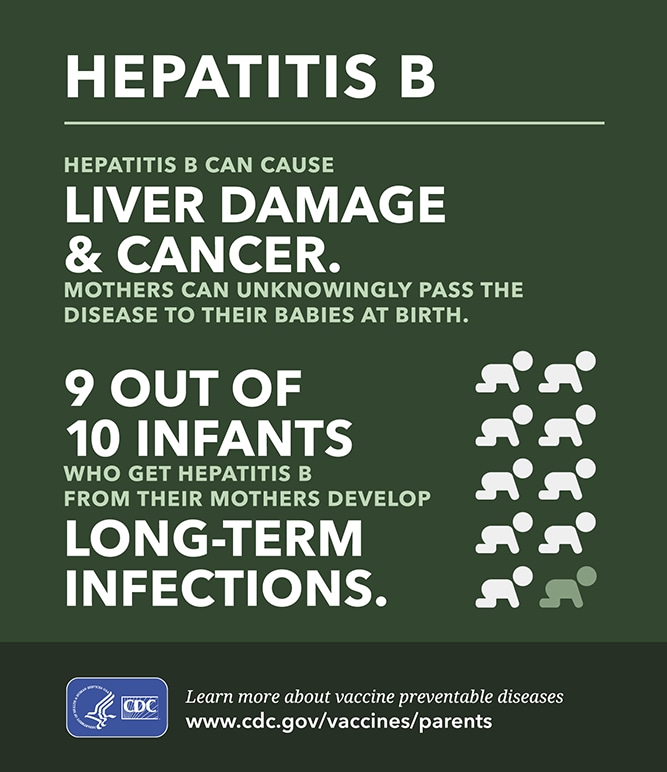The term "hepatitis" means inflammation of the liver. This can be due to a variety of causes. Usually, it refers to a group of viral infections that affect the liver. The liver is one of the most important organs in the body because it filters your blood. The most common types of viral hepatitis in the United States are hepatitis A, B, and C.
Hepatitis A
Hepatitis A is a contagious liver disease. It results from infection with the hepatitis A virus (HAV). HAV can range in severity from an illness lasting a few weeks to a severe illness lasting months. Hepatitis A is usually spread when a person eats food contaminated with a small amount of feces. A person can also get infected by touching objects, food, or drinks contaminated by the feces of an infected person. Learn more about hepatitis A through the Division of Surveillance and Investigation.
More than 80% of adults with hepatitis A have symptoms. Most children do not have symptoms. A person cannot get infected with hepatitis A twice.
Frequent hand washing with soap and water can help prevent the spread of hepatitis A.
The best way to prevent hepatitis A is to get vaccinated. Vaccination is recommended for all children, for travelers to certain countries, and for people at high risk for infection. Anyone can get hepatitis A from food sources. Certain groups of people are at higher risk for infection, such as those who:
-
- Travel to or live in countries where hepatitis A is common
- Are men who have sexual contact with other men
- Have clotting-factor disorders, such as hemophilia
- Live with someone who has hepatitis A
- Have oral-anal sexual contact with someone who has hepatitis A


Hepatitis B
Hepatitis B is a liver infection caused by the hepatitis B virus (HBV). A person gets hepatitis B through body fluids from a person who is infected with the virus. This commonly includes blood or semen. This exchange most often happens through:
-
- sexual contact;
- sharing needles, syringes, or other drug-injection equipment; or
- from a mother to baby at birth.
The hepatitis B virus can survive outside the body at least 7 days. During that time, the virus can still cause infection if it enters the body of a person who is not infected.
For some people, hepatitis B is an acute, or short-term, illness. For others, it can become a long-term, or chronic infection. About 2%–6% of adults and 90% of infected infants develop a long-term infection. Chronic hepatitis B can lead to serious health issues, like cirrhosis or liver cancer. The best way to prevent hepatitis B is by getting the hepatitis B vaccine. The hepatitis B vaccine is safe and effective and is usually given as 3 shots over a 6-month period.
The hepatitis B vaccine is currently recommended for all adults from 19-59 years of age. Those 60 years or older should get the vaccine if they have increased risk for hepatitis B. Those 60+ can get the vaccine for increased protection.
Although anyone can get hepatitis B, increased risk factors include:
-
- Sex with an infected person
- Multiple sex partners
- Sexually transmitted diseases
- Men who have sexual contact with other men
- Injecting drugs or sharing needles, syringes, or other drug equipment
- Living with a person who has hepatitis B
- Infants born to infected mothers
- Exposure to blood on the job
- Hemodialysis patients
- Travelers to countries with moderate to high rates of hepatitis B
Hepatitis C
Hepatitis C is a contagious liver disease that attacks the liver. It ranges from an acute illness lasting a few weeks to a chronic, lifelong illness. Hepatitis C is caused by infection with the hepatitis C virus (HCV). It spreads mainly through contact with the blood of an infected person.
Acute hepatitis C virus infection is a short-term illness. It occurs within the first 6 months after someone is exposed to the hepatitis C virus. In 80% of people, acute infection leads to chronic infection.
Chronic hepatitis C virus infection is a long-term illness. It occurs when the hepatitis C virus remains in a person’s body. Hepatitis C virus infection can last a lifetime and lead to serious liver problems. These include cirrhosis (scarring of the liver) or liver cancer.
The best way to prevent hepatitis C is by avoiding behaviors that can spread the disease. One of the main behaviors that leads to hepatitis C is injecting drugs. The hepatitis C virus can survive outside the body at room temperature for up to 2 months!
It is currently recommended that all adults get tested for hepatitis C at least once in their life. There is no vaccine available for hepatitis C.
Some people are at increased risk for hepatitis C, including:
-
- Travelers to certain countries that have higher rates of hepatitis C
- Recipients of donated blood, blood products/clotting factors, and organs
- (Once a common means of transmission; now rare in the U.S. since blood screening became available in 1992)
- People born between 1945 – 1965
- Due to changes in universal precautions in health care facilities
- People who received body piercings or tattoos in unregulated facilities with non-sterile equipment
- Persons on dialysis
- Current or past injection or intranasal drug use
- Health care workers with needle-stick injuries
- Persons living with HIV
- Children born to mothers infected with the hepatitis C virus
Hepatitis C Patient Assistance Programs
For those living with hepatitis C, you may be able to get help with meds through a patient assistance program.

HIV/HCV Patient Assistance Program
Those who are living with HIV and hepatitis C can use a VDH treatment assistance program. This is through the VA Medication Assistance Program (VA MAP). This program helps with certain medications. It can also help with payments for associated medical care and labs if you do not have health insurance. It may also help if your health insurance does not cover certain medications.
Covered Medications Include
-
- Harvoni
- Sovaldi
- Viekira Pak
- Ribavirin
Last Updated: June 26, 2023
